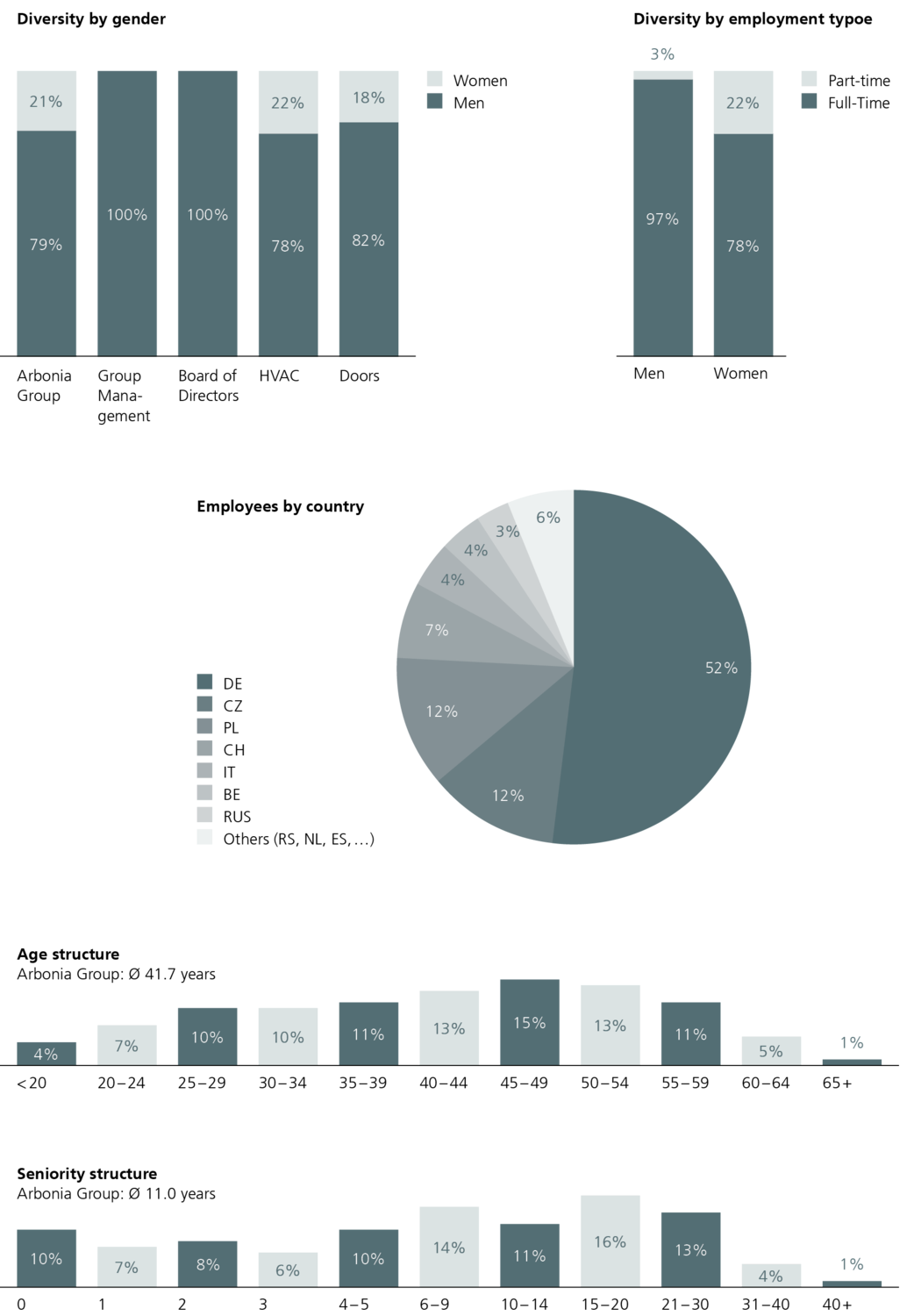Dynamic corporate culture
Arbonia practices a dynamic, open corporate culture and creates a pleasant, appreciative, and supportive working environment. Wages, social benefits, employment level, contractual conditions, and compensation comply with the principles of a responsible group. The positive work environment results in motivated and satisfied employees, which not only increases competitiveness but also reduces the gross fluctuation rate (including retirements). This was reduced further at Arbonia in the reporting year – from 10.7% in the previous year to 9.8% in 2021. To maintain and optimise the high level as a fair employer in line with the market, Arbonia regularly compares itself with other internationally operating companies of a similar size.
The diversity of employees, their equal opportunity, non-discrimination, as well as equal treatment in the company have great importance at Arbonia – regardless of sex, nationality, ethnic origin, skin colour, religion, or impairment. Although the labour market is regulated somewhat differently in each country, at Arbonia, the overarching guidelines of the group and the divisions apply at all sites.
Close social partnership
The close cooperation with employee representatives in all countries is a decisive factor for the commercial success of Arbonia. In Switzerland, the collective labour agreement of the Swiss mechanical, electrical, and metalworking industries (Swissmem) is applied at all companies – unless other mandatory collective labour agreements are valid. The contacts with the social partners in Switzerland therefore generally take place via this association, with which all companies in Switzerland are affiliated. The code of conduct (see "Ethics & integrity", p. 45), the salary system, leadership development, collective labour agreements, and wage agreements as well as strategic guidelines for human resources management are approved by the Board of Directors and consistently implemented across all levels down to the local sites. The group supports the divisions in succession planning and leadership development just as much as in collecting key performance indicators to review the effectiveness of measures taken. If necessary, personnel issues are also discussed and addressed across divisions.
Lawful and transparent starting position
The individual divisions communicate with their employees about relevant wage agreements via information boards and screens. In addition, the contracts can be viewed via the employee representation. It should be noted that there is no uniform procedure at Arbonia, since the requirements differ depending on the company and the domestic market. However, regular meetings take place everywhere between the company managers and employee representatives of the labour unions. The divisions have a standardised process when an employment relationship is terminated.
Training programmes as a matter of course
The number of learners, who largely work at Kermi, Prüm, and Garant in Germany, declined slightly – from 160 in the previous year to 156. Arbonia supports the vocational further development of employees with educational leave and shares the costs in some cases. To promote young college students in a practical and targeted manner, the Group offers "dual study places" every year. Internal and external training courses ensure that employees are quickly familiarised with all technical innovations and can thereby optimally prepare themselves for changing technical requirements. Course rooms and exhibits at the production sites offer employees the unique possibility to get to know manufacturing processes during operation. Arbonia determines the further training needs with the help of annual performance reviews and via the close cooperation between superiors and the human resources department. Employees evaluate the quality of the further training after completing the programme, and superiors and external training institutions also sometimes fill out an evaluation document.
Composition of the workforce as of 31 December
¹ The companies Temovent, Cicsa, and GVG, which were newly acquired in the reporting year, were not taken into account in the previous year.
Heating, Ventilation and Air Conditioning Division
Principles for a dynamic corporate culture
A dynamic corporate culture makes it possible to exchange and combine experiences and different perspectives that can improve performance within the company. Because this topic is relevant on all levels and in all areas, the companies of the HVAC Division pay special attention to observing and promoting a dynamic corporate culture.
The division places value on strict compliance with legal principles and the current regulations, including the General Equal Treatment Act (AGG) and the company's code of conduct. In the case of infringements, disciplinary actions are correspondingly initiated. In the reporting year, Sabiana launched a programme for improving human resources management, in order to evaluate the expectations of employees and the management approach in this area. In the case of complaints, employees of the HVAC Division can contact their superiors or the Group's human resources or compliance departments at any time – complaints are always handled anonymously. In the case of complaints regarding the protection of personal data, employees can use an e-mail address provided for this purpose.
Target-oriented for higher employee satisfaction
As part of their dynamic corporate culture, the companies of the HVAC Division have set high goals for themselves: Kermi aims to react quickly to changing conditions. A reduction in the fluctuation rate and increasing employee satisfaction remain core goals, which are to be achieved by, among other things, implementing further personnel development measures as well as increasingly integrating employees with a migration background. Concretely, for example, Sabiana aims to reduce fluctuation to below 2% through increased employee satisfaction. It reviews the satisfaction of its employees every two years with a survey. In addition to the survey, an analysis of mental health and work-related stress factors is also carried out. The evaluation is presented to the Managing Director, and various measures are evaluated on the basis of this data.
To fill employment vacancies quickly with qualified people, Kermi would like to emphasize employer branding more in the future. Through a targeted recruitment of new employees and increased retention of current employees, the company wants to try to master the demographic development without any loss of quality. Sabiana is basically pursuing the same objectives and intends to partner with a company from the same line of business to promote employee satisfaction via an exchange programme for highly qualified employees. The success of these measures will be evaluated based on the key performance indicators and the fluctuation rate. The division offers various work and part-time models and offers mobile work depending on the technical possibility.
Talent acquisition and retention
At Kermi, all advertised positions and offered apprenticeship places could be filled over the course of the business year, despite the shortage of skilled workers. In-house trainees from the company's own vocational training are prepared for higher tasks through targeted support. The same holds true for college graduates, who can qualify for specialist activities through targeted assignments. Vacant leadership positions at the HVAC Division are mostly filled with in-house young staff. The shortage of skilled workers on the labour market remains one of the greatest challenges, though. This problem is cushioned by the low fluctuation rate and the long employment lengths. At Sabiana, the high level of employee satisfaction has become the most important key performance indicator. In addition, the companies always strive for non-discrimination and gender-neutral recruitment processes in recruiting.
Doors Division
Corporate culture as part of corporate identity
The dynamic corporate culture is extremely relevant in the Doors Division as well: Because this topic is a major part of employer branding and reflects the social responsibility of the individual companies, it has a correspondingly high importance. The observance of all legal principles and internal regulations is consistently implemented at Kermi. Invado has introduced expanded and detailed guidelines as part of its dynamic corporate culture – including work rules, an anti-bullying policy and an anti-discrimination policy, as well as a complaints procedure for employees. Concretely, the division has set up an external, neutral reporting office for complaints. The division also provides the inter-company reporting office of Arbonia, the Group Head of Legal and Compliance, for complaint reports. Last but not least, Invado supports its employees with an in-house social fund when necessary.
Measures in the corporate culture area
The main goals of the individual companies in the Doors Division are largely identical: A further increase in employee satisfaction is to keep fluctuation low and decrease it if possible. Measures for employee retention are, for example, increased efforts in the area of HR development or an improved integration of employees with a migration background. A clear employer branding is to emphasize the characteristics of the individual companies better. In this way, the Doors Division hopes to fill vacant positions with qualified employees faster. At Garant, for example, it was possible to reduce the fluctuation rate in the reporting year. In addition to reducing the fluctuation rate, the company also wants to shorten the duration of the rehiring process, among other things with professional onboarding systems as well as by developing new key performance indicators in human resources. In general, the division is pursuing the goal of meeting changing circumstances faster and more flexibly. The progress in achieving these goals is checked by means of key performance indicators such as fluctuation rate or length of employment. At Invado, the goals – which include a further diversification of top management with currently 40% women – are checked at regular intervals by external audits.
Qualified workers
Although the situation on the labour market remained tight, there were no significant problems in recruiting at Kermi and Bekon-Koralle: All advertised positions and offered training places were able to be filled promptly in the reporting year. As in the past, vacant leadership positions were mostly filled internally. The support of trainees and college graduates proved to be a great advantage in this respect once again. However, despite a low fluctuation rate and long employment lengths, the lack of skilled workers remains challenging. At Invado, COVID-19-related absences occurred and, as a result, a noticeable staff shortage.

